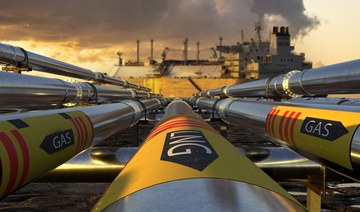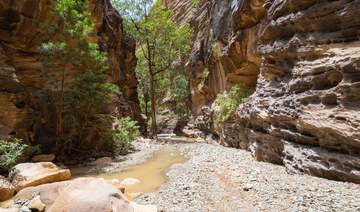KARACHI: Pakistan’s Gross Domestic Product (GDP) hit a 13-year-high growth rate of 5.79 percent in the current fiscal year, against the projected 6 percent, the country’s top economic managers announced in Islamabad on Thursday.
The Minister for Planning and Development, Ahsan Iqbal, and the Adviser to the Prime Minister on Finance, Miftah Ismail, credited the performance of the agriculture, manufacturing and services sectors for the achievement.
Presenting the Pakistan Economic Survey 2017-18, an annual report on the performance of the country’s economy, Iqbal said the government narrowly missed its growth target due to the political turmoil in the country, which negatively affected economic progress.
The ruling Pakistan Muslim League-Nawaz party “focused on its four-point agenda, including energy, economy, elimination of terrorism and education by making two plans,” he said, adding: “The government, in the absence of any development framework, faced major constraints.”
Highlighting the government’s achievements during its tenure, Iqbal said it allocated Rs 47 billion ($406 million) to higher education, added 11,000 megawatts to the national grid, and built 1,750 kilometers of roads.
“Ninety-five percent of the budgetary expenditures will remain the same for the next government,” Ismail said, adding: “The in-coming government can modify the budget according to its own strategies.” A general election is scheduled for July 15, 2018.
According to the survey, GDP grew by more than 5 percent in each of the past 2 years, and by 4 percent in each of the three preceding years.
“This achievement is remarkable as it has been accomplished in the face of global headwinds,” according to the report. “The strong economic growth has been underpinned by supportive macroeconomic supply-and-demand policies.”
It added: “In fiscal year (FY) 2018, the agriculture, industry and service sectors grew by 3.81 percent, 5.80 percent and 6.43 percent, respectively.”
The growth was achieved in a country that incurred Rs 10.76 trillion in direct or indirect costs over the past 17 years due to terrorism.
Pakistan also continues to face a balance of payments challenge due to an increasing current-account deficit that reached $12 billion during July-March FY 2018, and is expected to top $15 billion by the end of current fiscal year.
The survey reveals that the country’s total revenue grew by 19.8 percent to Rs 2.4 trillion, or 6.9 percent of GDP, during July-December, FY2018.
The consumer price index, a measure of the change in the cost of household goods and services, rose by 4.6 percent, the highest increase since the start of the current fiscal year. In January 2018, the increase fell to 4.4 percent and in March it dropped to 8-month low of 3.2 percent on account of subdued food prices, according to the report.
Government borrowing from external sources to finance the fiscal deficit was Rs 384 billion. The increase in external debt reflected both borrowings for financing the deficit as well as a revaluation of losses due to the depreciation of Pak Rupee against the US Dollar, as well as the appreciation of other currencies against US Dollar.
The survey also noted that Pakistan was harnessing its geostrategic location into a geo-economic advantage through the China Pakistan Economic Corridor.
However, the document pointed out that some risks and challenges remained on the domestic and external fronts, particularly the unfavorable balance-of-payments position.
Government releases Pakistan Economic Survey, highlighting financial performance and challenges
Government releases Pakistan Economic Survey, highlighting financial performance and challenges
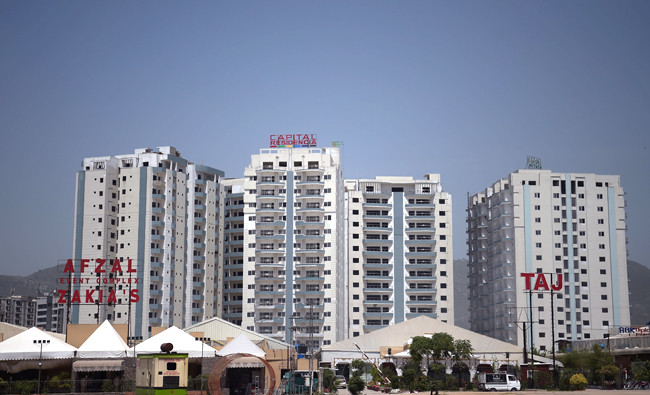
- Pakistan achieved growth rate of 5.79%, the highest in 13 years.
- The country incurred costs of $126.79 billion during the past 17 years due to terrorism.
ADNOC to boost production target by 2030

RIYADH: The Abu Dhabi National Oil Co. plans to boost its local manufacturing target for critical industrial products to 90 billion dirhams ($24.5 billion) by 2030 in a bid to strengthen the UAE’s industrial sector and expand local manufacturing capabilities.
ADNOC made the announcement at the “Make it in the Emirates” forum, adding that the new target is part of its expanded In-Country Value program, which aims to drive an additional 178 billion dirhams back into the UAE economy by 2028.
“This expanded initiative will support the UAE’s economic diversification, attract local and international investors, and provide high-skilled private sector jobs for UAE nationals. Additionally, it will stimulate entrepreneurial growth and drive sustainability in ADNOC’s supply chain,” said Sultan Ahmed Al-Jaber, minister of industry and advanced technology, and ADNOC managing director and group CEO.

This expanded initiative will support the UAE’s economic diversification, attract local and international investors.
Sultan Ahmed Al-Jaber, UAE minister of industry and advanced technology
The company said its previous 2027 target of 70 billion dirhams worth of products was “delivered ahead of schedule” following the award of two contracts for metal pipes and valves worth 16.8 billion dirhams to local manufacturers.
The contracts include 8.8 billion dirhams for metal pipes to PM Piping Petroleum Equipment, Ajmal Steel, and the Emirati-owned Al Gharbia Pipe Co.; and 8 billion dirhams for mechanical valves to Samamat, Camtech Manufacturing, Tisco Valves Manufacturing, PTPA, MT Valves and Industries.
ADNOC’s expanded ICV program also aims to provide a micro, small and medium enterprises accelerator program to enable Emirati businesses and local mSMEs to conduct business across ADNOC’s supply chain.
Saudi Arabia’s Sports Boulevard doubles its existing investment fund to $533m
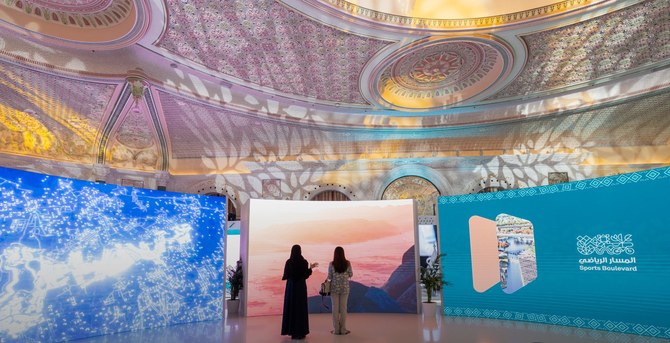
RIYADH: Private sector participation in the Sports Boulevard project is set to increase as the foundation behind Riyadh’s largest linear park plans to double its investment fund to SR2 billion ($533 million).
In a press release, the Sports Boulevard Foundation announced its partnership with Ajdan Real Estate Development Co. and Albilad Capital to add an additional SR1 billion to the private real estate investment fund “Sports Boulevard Real Estate Fund 1.”
This increased funding will be utilized to bolster private sector participation within the Arts District, one of the destinations within the Sports Boulevard project.
The Sports Boulevard Development Co. will continue to hold the majority of units in the fund, while Ajdan Real Estate Development Co. will serve as a developer and primary investor, and Albilad Capital will act as the fund manager.
This partnership underscores the collaborative effort behind the expansion, signifying a strategic alliance aimed at creating a vibrant urban space that enhances Riyadh’s cultural and economic landscape.
The project aims to develop a mixed-use lifestyle destination consisting of residential, retail, office, and entertainment components.
Covering a land area of over 39,000 sq. m. at the heart of the Arts District, the total combined built-up site spans approximately 240,000 sq. m., boasting over 100,000 sq. m. of net leasable area.
The design of this destination draws inspiration from the Sports Boulevard Design Code, influenced by the Salmani Architectural Style. This ensures a dynamic and immersive lifestyle experience for both residents and visitors.
Situated at the intersection of Prince Mohammed bin Salman bin Abdulaziz Road and Prince Turki bin Abdulaziz Al Awwal Road, it offers expansive public spaces, recreational areas, and cycling-friendly tracks.
Covering an area of 184,000 sq. m., the project extends beyond private development parcels, providing ample space for recreational activities and pedestrian-friendly pathways, efficiently linked to the promenade and cycling bridge.
Sports Boulevard, a mega project launched by King Salman bin Abdulaziz in 2019, and supported by Crown Prince Mohammed bin Salman bin Abdulaziz, spans over 135 km on Prince Mohammed bin Salman bin Abdulaziz Road.
It features safe green pathways for pedestrians, cyclists, athletes, and horse riders, connecting Wadi Hanifah in the west to Wadi Al Sulai in the east.
Additionally, the project includes over 4.4 million sq. m. of greenery, open spaces, and up to 50 multidisciplinary sports facilities. It also hosts several unique destinations and investment zones, totaling an area exceeding 3 million sq. m.
Closing Bell: Saudi benchmark index edges down to close at 11,831
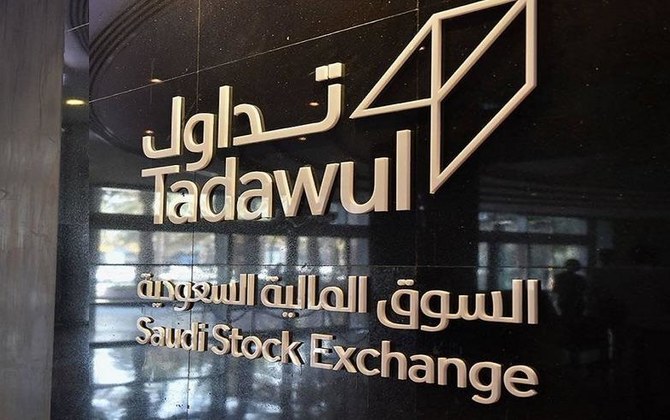
RIYADH: Saudi Arabia’s Tadawul All Share Index slipped on Monday, losing 19.42 points, or 0.16 percent, to close at 11,831.22.
The total trading turnover of the benchmark index was SR5.8 billion ($1.5 billion) as 110 stocks advanced, while 108 retreated.
On the other hand, the Kingdom’s parallel market Nomu also slipped 189.65 points, or 0.71 percent, to close at 26,448.54. This comes as 30 stocks advanced while as many as 34 retreated.
Similarly, the MSCI Tadawul Index also dropped 2.67 points, or 0.18 percent, to close at 1,470.41.
The best-performing stock of the day was Saudi Paper Manufacturing Co. The company’s share price surged 4.89 percent to SR75.10.
Other top performers included CHUBB Arabia Cooperative Insurance Co. as well as Middle East Specialized Cables Co., whose share prices soared by 3.96 percent and 3.46 percent, to stand at SR34.10 and SR32.85 respectively.
On Nomu, Osool and Bakheet Investment Co. was the top gainer, with its share price rising by 9.22 percent to SR48.
Other best performers on Nomu were View United Real Estate Development Co. as well as Al-Modawat Specialized Medical Co., whose share prices soared by 6.53 percent and 6.20 percent to stand at SR79.90 and SR150.80, respectively.
Additional top gainers included Almujtama Alraida Medical Co. and Bena Steel Industries Co.
On the announcement front, Saudi Basic Industries Corp., known as SABIC, received all necessary approvals from relevant authorities to complete the acquisition of its subsidiary Saudi Iron and Steel Co., also known as HADEED, by the Public Investment Fund.
In a statement on Tadawul, SABIC announced that it has satisfied all transaction-related conditions to complete the SR12.5 billion acquisition announced earlier in September 2023.
Furthermore, Saudi Arabia aluminum producer Al Taiseer Group Talco Industrial Co. is listing a 30 percent stake on the Tadawul stock exchange following an initial public offering, setting the final offer price at SR43 per share.
The company is selling 12 million shares and has completed the book-building process for institutional investors, which saw a coverage of 68.5 times the total offer shares, according to Alinma Investment Co., the lead manager and financial adviser to the issuance.
The book-building process for retail investors will run for two days starting on May 28. During this time, they can subscribe to a maximum of 10 percent of the shares. The final share allocation is set for June 2.
Saudi Arabia focused on promoting energy efficiency: top official
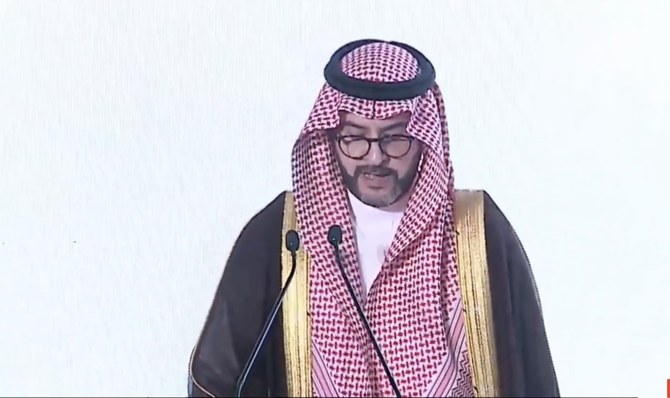
RIYADH: Saudi Arabia’s budding energy efficiency sector has witnessed notable growth, with the number of licensed service providers reaching 55 by the end of 2023, says a top official.
As the Kingdom strives to reduce its carbon footprint, with recently amplified goals to achieve net-zero by 2060, the Saudi Energy Efficiency Center is working to aide the nation in realizing these ambitions, Nasser Al-Ghamdi, the CEO of the center noted.
In his inaugural address at the Saudi ESCO forum, the top executive stressed the entity’s role in raising awareness about energy efficiency. He highlighted that 26 universities nationwide have adopted energy efficiency topics and courses in their curricula.
“Since the inception of the center, we have launched various initiatives that will help in reducing energy consumption,” Al- Ghamdi said.
Among these undertakings, the body has succeeded in launching and implementing more than 200 training programs in the field of energy efficiency, the CEO added.
The executive emphasized that the center has strived to create the necessary ecosystem for suppliers and their beneficiaries in this “promising market” to ensure the quality of energy-efficiency service providers.
He added that this will be achieved through the application of a licensing system for those interested in investing in this field after meeting the technical requirements necessary to provide the service.
Highlighting the role that the fledgling sector is playing in achieving net-zero goals, the CEO said: “The sector, which is considered relatively new, is helping companies and enterprises and buildings in finding solutions to efficiently use energy, including financing and managing solutions and projects. These companies also contribute energy consumption analysis and knowing opportunities for companies to improve their consumption.”
Due to the absence of energy efficiency activities in the commercial sector, one of the highest energy consumers in the Kingdom, accounting for 15.7 percent of total consumption of facilities in the nation, the body launched a pilot project to improve this field.
The initiative aims to improve conditions in the commercial sector by raising business owners’ awareness of opportunities, as implementing energy auditing projects is expected to improve overall efficiency.
Yanbu Royal Commission teams up with Skytower Investments for industrial projects development
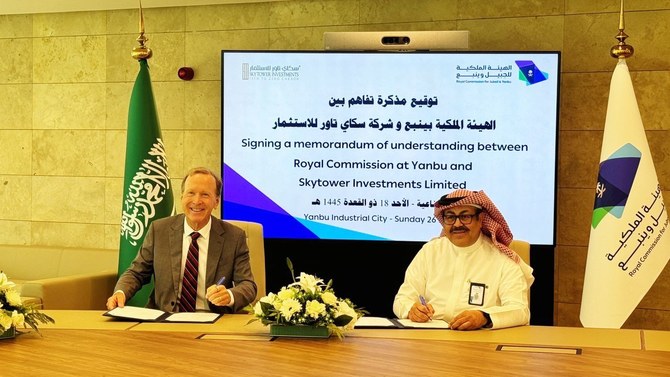
RIYADH: Saudi Arabia’s Yanbu governorate is poised to see the development of several industrial projects following an agreement between its Royal Commission and Skytower Investments Ltd.
The memorandum of understanding, signed by the commission’s CEO, Abdul Hadi Al-Juhani, aims to develop industries in the petrochemicals sector, specialized chemicals, renewable energy, and other manufacturing divisions.
This MoU signing is part of the Royal Commission’s ongoing efforts to attract more local and international investments to Yanbu Industrial City in promising sectors, aligning with the objectives of Saudi Vision 2030 programs.
Headquartered in Riyadh, STI is an investment firm specializing in renewable technology, green manufacturing, supply chain, and green power production.
“This is a result of significant development over the past nine months by both teams paving the way for more international manufacturing and localization projects landing in Yanbu,” Skytower said in a tweet on X.
It added: “This agreement will pave the way for more international manufacturing and localization projects landing in Yanbu, an industrial heartland with complete industry infrastructure and extensive manufacturing experiences.”
In April, STI signed a four-party joint agreement with Chinese automaker Chery Automobile Co., the Ministry of Investment, and the National Industrial Development Center.
This collaboration, driven by Saudi Arabia’s Vision 2030, signifies a crucial step toward future economic opportunities and the well-being of the Saudi people.
In August 2023, the Kingdom’s untapped southern region took a significant step toward welcoming international travelers.
Cruise Saudi and the Royal Commission for Jubail and Yanbu signed an MoU to unlock the region’s tourism potential. This strategic partnership was aimed at positioning the southern region as a captivating tourist destination, fostering growth in the travel sector and contributing to the region’s economic advancement.
Formalized during the MASAREB ceremony held in Jazan, the agreement encompassed a spectrum of efforts, from knowledge transfer to mutual alignment on ventures aimed at establishing the destination and yielding a positive local impact.
STI is a global partnership between NGOs, green businesses with advanced eco-friendly technology, sustainable manufacturing, and Saudi’s national sustainable economic development authorities.
Their aim is to develop practical plans for industry decarbonization, economic revitalization, technological advancement, and carbon-neutral technology.


